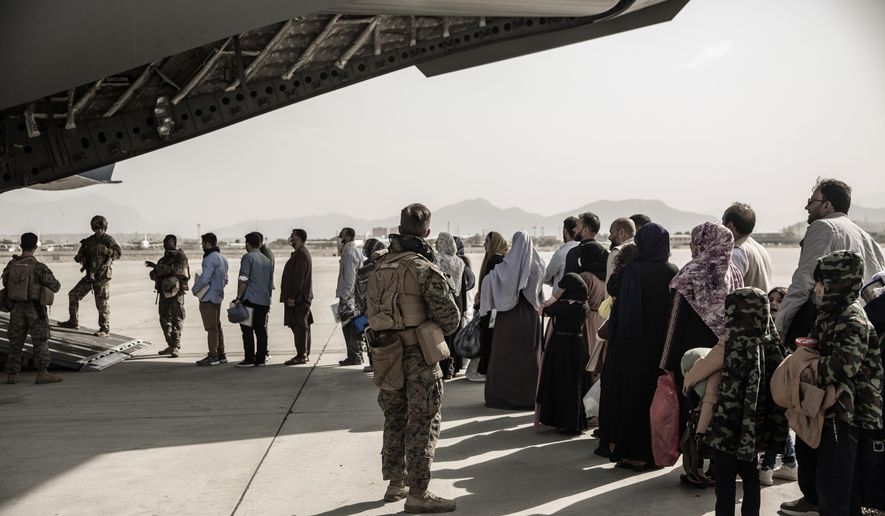Six months after the end of the Afghan airlift, congressional Republican investigators say it’s time for the Department of Homeland Security to release details of the 76,000 Afghan evacuees who’ve been brought to the U.S. and released into communities around the country.
In a letter Friday to Homeland Security Secretary Alejandro Mayorkas, Republicans on the House Oversight and Reform Committee complained that they’re still being stonewalled half a year after the evacuation from Kabul in their quest to find out who was brought into the country, exactly what vetting they faced, what legal authority was used to bring each of them here, and what states they ended up in.
The lawmakers said the Biden administration’s “chaotic” withdrawal spawned numerous problems — including potential security risks from poor vetting.
“We are particularly concerned that terrorists or other bad actors may seek to take advantage of our goodwill, exploiting any weakness in border security and vetting of foreign nationals seeking to enter the United States,” the Republicans wrote in the letter, obtained first by The Washington Times.
The letter, led by Rep. James Comer, the ranking Republican on the committee, and Rep. Yvette Herrell, New Mexico Republican, comes a week after a devastating report by the Pentagon’s inspector general, who found that key Defense Department security databases weren’t checked as part of the initial vetting.
As of early November, at least 50 Afghans had been brought to the U.S. who were later found to have significant security concerns in those unchecked databases. Those included issues such as having their fingerprints found on explosives and being categorized as “known or suspected terrorists.”
DOCUMENT: Letter to DHS regarding Afghan evacuees
A review of 31 of those Afghans who’d reached the U.S. as of Sept. 17 found that only three “could be located.”
“Not being able to locate Afghan evacuees with derogatory information quickly and accurately could pose a security risk to the United States,” the inspector general concluded.
The Times reached out to Homeland Security Department officials for a response to the report.
Administration officials have previously defended the vetting process as “rigorous.” Mr. Mayorkas has described it as “multi-layered, multi-agency screening and vetting” conducted overseas — before anyone reaches the U.S. That process involved running names against government databases. Those whose names raise security flags then had to clear in-person interviews before they could come to the U.S.
But the new inspector general’s report indicates the database checks were not as thorough as they could have been.
The Republican lawmakers, in their letter Friday, pointed out that they were already asking about evacuee concerns in late August, as the Pentagon’s massive airlift was winding down and the Taliban insurgency was taking power in Kabul.
Six months later, they told Mr. Mayorkas that those answers are overdue, and they added a series of new questions based on what’s happened since.
The lawmakers said they now want to know the breakdown, by state, of where all 76,000 Afghan evacuees were resettled, and what their legal status is.
Republicans also probed how Homeland Security officials have responded to the security red flags raised by the inspector general.
While the airlift was billed as a chance to rescue authentic allies — Afghan nationals who risked their lives to assist the 20-year U.S. war effort — the “vast majority” didn’t meet that standard, the Republicans said. Instead, they were brought to the U.S. under a more generic category of “vulnerable Afghans.” The Republicans asked for information on how the government came up with that definition.
Experts tell the Times that the U.S. appeared to be taking nearly anyone who was able to reach the airport in Kabul in the final weeks of August, rather than screening for would-be refugees and those who genuinely worked with the U.S. and allied war effort.
Most of those who made it to the U.S. were brought under Mr. Mayorkas’ special “parole” powers. Some will eventually qualify for the special visa for allies who assisted the war effort, but analysts doubt most will.
Parole is a tentative status that brings work permits and some taxpayer benefits. It can be renewed, but does not include a direct path to citizenship.
Those in the U.S. on parole can apply for asylum, which is a permanent legal status, but one early ruling last month in an asylum case suggests the Homeland Security Department is taking a strict approach. The application received a “notice of intent to deny” because, the adjudicator said, while conditions in Afghanistan are bleak, the applicant couldn’t prove he or she faced personal danger.
• Stephen Dinan can be reached at sdinan@washingtontimes.com.




Please read our comment policy before commenting.